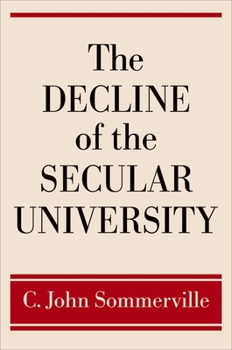The Decline of the Secular University
Select Format
Select Condition 
Book Overview
The American university has embraced a thorough secularism that makes it increasingly marginal in a society that is characterized by high levels of religious belief. The very secularization that was supposed to be a liberating influence has resulted in the university's failure to provide leadership in political, cultural, social, and even scientific arenas. In The Decline of the Secular University, C. John Sommerville explores several different...
Format:Hardcover
Language:English
ISBN:0195306953
ISBN13:9780195306958
Release Date:June 2006
Publisher:Oxford University Press
Length:160 Pages
Weight:0.70 lbs.
Dimensions:0.7" x 6.0" x 8.3"
Customer Reviews
2 ratings
Athens and Jerusalem revisited
Published by Thriftbooks.com User , 18 years ago
This book is a breath of fresh air, a desperately needed antidote to the secularism of the modern academy. In clear, elegant, passionate prose, Sommerville makes his case for why religious discourse needs to take place in the academy again, and not just in terms of what people actually believe, but through the use of religious concepts, such as morality, human transcendence, purpose, etc. as applied even to the most secular bastions of inquiry, including science, history and philosophy. For a book this short the breadth and scope of this book is amazing. Sommerville touches on human nature, the scope and character of science, religious studies, the fact/value dichotomy, all contributed to his overall case for religion in the university. It simply bristles with brilliant insights. For example, referring to the tendency to subordinate humanity to an indifferent Universe, Sommerville notes that "the fact that nature contains human beings says something about nature as well", meaning that, if nature is indifferent, and human beings are a part of nature and they care, what does that say about human beings or nature? Likewise concerning the debate over animal rights, in referrence to the title of a book by Peter Singer called "Animal Rights and Human Obligations", Sommerville observes that unless the titular roles can meaningfully be reversed to read "Human rights and animal obligations", there is no case to be made, because animals will not participate in the resulting moral discourse. Sommerville also makes some long-overdue observations about the secular critique of Christianity. When secularists condemn the Crusades, the Inquisition and so on, they do so based upon Christian moral principles, as these events would not have been criticized in, say, the Roman Empire. It is obvious that ideas such as truth, meaning, morality, purpose, transcendence, justice, beauty, etc. have coherent and well-defined roles in the Christian discourse, whereas secular culture seems to have borrowed them wholesale from Christianity and it seems very difficult to ground them in any secular meaning whatsoever. Sommerville also pays attention to the need to recognize the different kinds of rational discourse and the necessary relativism that arises, without succumbing to post-modern incoherence. Just from the footnotes it is clear that religious thinkers have a veritable treasure house from which to draw sound, important scholarship, including philosophers such as Charles Taylor, Alvin Plantinga, Alasdair MacIntyre, etc., historians such as Mark Noll and George Marsden, theologians like Emil Brunner and John Millbank, etc. The Father's house has many mansions indeed, which we ignore at our peril. In all this book is inspiring and inspired. It clearly represents the culmination of a lifetime of dedicated scholarship by an eminent historian who is also a Renaissance man in the fields of philosophy, sociology and science. Secular scholars should read and be challenged. R
Provocative and Important Stuff
Published by Thriftbooks.com User , 18 years ago
Sommerville's arguments will threaten and infuriate many, but his challenge deserves to be engaged, not dismissed or emoted against. Secularism's exclusion of religious perspectives, the book argues, undercuts the very intellectual mission of higher education broadly defined. The open-minded reader will find it a very persuasive case. Short, provocative, easy reading.





